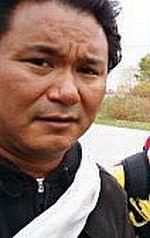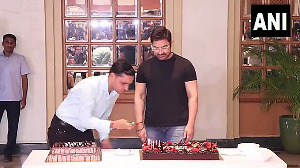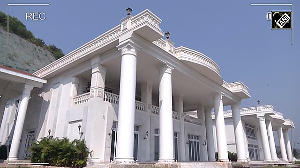 When he was not walking between cities to focus on the Tibetan cause, Jigme K Norbu would be talking about Tibet in the Snow Lion restaurant his father, the Dalai Lama's older brother, had started decades ago in Bloomington in Indiana, US.
When he was not walking between cities to focus on the Tibetan cause, Jigme K Norbu would be talking about Tibet in the Snow Lion restaurant his father, the Dalai Lama's older brother, had started decades ago in Bloomington in Indiana, US.
It introduced not only Tibetan food -- "Sorry, we don't have yak steaks," Norbu would say -- in a small American city, but also popularised a number of Indian dishes.
Norbu, 45, who died last week in Florida while tackling the day's final two miles of his walking tour to publicise the demand for Tibetan independence from the Chinese, had been active in the Tibetan cause for more than two decades.
He was expected to attend a Bikram Yoga studio event near the historic city of St Augustine February 16, but he died the previous day, struck by a car on the dark coastal highway.
During most of his walks, he carried a portrait of his uncle, the Dalai Lama, though Norbu and his father differed from the exiled Tibetan spiritual leader in their approach to Tibetan freedom. Jigme K Norbu was marking through his latest march the 50th anniversary of the failed Tibetan rebellion against the Chinese.
Jigme K Norbu was marking through his latest march the 50th anniversary of the failed Tibetan rebellion against the Chinese.
His father Taktser Rinpoche -- whose given name was Thupten Jigme Norbu -- fled China just around the time the Dalai Lama fled the Chinese takeover in 1959 and arrived in India, which has been his home since then.
For some time, Rinpoche worked for the Central Intelligence Agency in Taiwan as a translator; though he was close to his brother throughout his life, Rinpoche, who died in Bloomington at age 86 three years ago, did not believe in compromising with the Chinese and was not satisfied with autonomy.
In Bloomington, he also started a Tibetan centre, and taught Tibetan history and religion at the University of Indiana for over two decades.
Norbu completed at least 21 walks and bike rides, logging more than 7,800 miles in the United States and abroad to support freedom for Tibet, friends and supporters say. He completed his most recent 300-mile trek in December in Taiwan.
Most people who have known him and his father said the walks were symbolic and though the father had at time organised from his Taiwan base a small uprising in Tibet, he too was active more in gestures than any real action. Even then, to many young Tibetans in exile, father and son offered a kind of solace.
"We love the Dalai Lama because he is a saint, and a very kind man," said a Tibetan woman in her late twenties. She was born in a Tibetan settlement near Madikere, Karnataka, and did not want to give her name as she is going through a visa change in New York. "But Norbu made us think if the Dalai Lama's approach (to the Tibetan problem) is the right one."
David Colman, whose son has an arts store near Norbu's restaurant, told the media soon after Norbu's death that the young leader 'was maturing. Jigme was growing into being a full-fledged figurehead for Tibet.'
Norbu often spoke about his relationship with his uncle.
'It's hard sometimes,' he told the Chicago Tribune years ago, 'I don't get next to him that often. I can't just hug him or anything like that. You don't do things like that. Sure I have an audience with him. Sure I see him. I respect him to the point where if I am in India I don't go see him every day. He's got more important things to do. He's got 6 million Tibetans to worry about.'
Author-educator and blogger Donna Kim-Brand, who was driving the support van for Norbu and 67-year-old Wangchuk Dorjee-La, a former Tibetan parliament member on his fourth walk with Norbu, said Norbu's death would not be in vain.
'Jigme and elder Wangchuk walked all day until Wangchuk couldn't do more,' she blogged. 'Jigme insisted to finish another 2 miles on his own, in the growing dark, even though we asked him not to.'
She revealed that when Norbu refused to get in the van, she and Wangchuk went ahead to greet the next group of supporters and to wait for Norbu.
Kim-Brand, who offers charitable programs, especially for women to empower themselves, was critical of the media.
'We are just sad that the press was more interested in the story only when it involved this type of tragedy,' she wrote. 'Rather than the ongoing tragedy of what is happening inside Tibet.'









 © 2025
© 2025